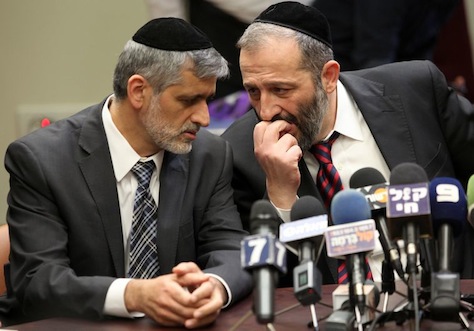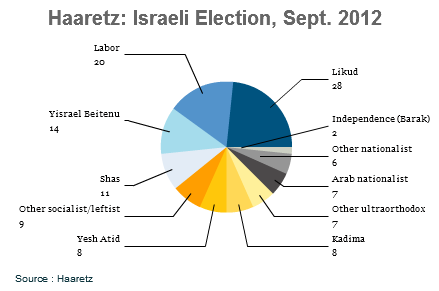 Photo credit to Marc Israel Sellem / The Jerusalem Post.
Photo credit to Marc Israel Sellem / The Jerusalem Post.
Since the emergence of Shas (ש״ס) in 1984, there’s hardly been a government that hasn’t included the ultraorthodox party.![]()
In 31 years, Shas has joined the opposition just twice, including a stint between 2003 and 2006. It’s been out of government since 2013, not out of its unwillingness to work with Israeli prime minister Benjamin Netanyahu, who hopes to win a third consecutive mandate on March 17, but because of opposition from Yair Lapid, who joined Netanyahu’s government as finance minister.
In the current election, however, a recent split between the two men who have led Shas for the past quarter-century now holds massive consequences for whether Netanyahu will win a fresh mandate as prime minister. The split risks not only diluting the haredi vote in the upcoming elections, but could also complicate the already difficult arithmetic for any leader to achieve a governing majority in the Knesset (הכנסת), Israel’s 120-member unicameral parliament. Ironically, the split on the ultraorthodox right comes at the same time that Israel’s Arab parties have united into a single movement.
Aryeh Dery served as Shas’s leader in the 1990s and held several top positions, including minister of internal affairs. He was convicted of bribery in 2000, however, and ultimately served 22 months in prison. Eli Yishai replaced him as Shas leader and, for the next 13 years, followed Dery’s lead of bringing Shas, more often than not, into government. Yishai (pictured above, left, with Dery, right) served as deputy prime minister under each of Ariel Sharon, Ehud Olmert and Netanyahu.
Dery’s return to politics, however, caused a personal rift between the two leaders. Dery muscled his way back to the Shas leadership in 2013, which precipitated Yishai’s decision last December to form a new party to contest the 2015 elections, Yachad (יחד). The differences between Dery’s Shas and Yishai’s Yachad are subtle. Both parties appeal to the haredi right, and both continue to draw support primarily from Sephardic Jews.
Though Shas is widely and accurately described as a party of the haredi, the ultraorthodox Jews in Israel, it is also traditionally a party that appeals chiefly to Sephardic Jews, which hold just a slight majority among Israel’s Jewish population, though the Ashkenazi Jewish population, which has roots primarily in Eastern Europe, has grown, in large part to an influx of Russian Jews after the fall of the Soviet Union. Today, however, the Sephardic label applies not only to the Sephardic tradition that developed on the Iberian peninsula, but to the wider group that includes Maghrebi Jews from north Africa and Mizrahi Jews from the Middle East.
* * * * *
RELATED: Israeli Arabs unite with fresh voice for non-Jewish voters
RELATED: Who is Isaac Herzog? A look at Israel’s opposition leader.
* * * * *
In the current campaign, Dery has emphasized social and ethnic solidarity, with slogans as blatant as ‘Mizrahi votes Mizrahi.’ Nevertheless, Yachad still appeals to core Shas voters, and Yishai has capitalized on the impression that he is the more authentic standard-bearer of the late rabbi Ovadia Yosef, who served until his death in December 2013 as Shas’s spiritual guide. Videotapes emerged late last year of Yosef critizing Dery in 2008 in very harsh terms.
But Yachad is also targeting disappointed voters of Bayit Yehudi (הבית היהודי, ‘The Jewish Home’). In joining Netanyahu’s most recent government as economy minister, its leader Naftali Bennett (himself a former chief of staff to Netanyahu) was sure to disappoint some of his most conservative supporters. But Bennett often criticized Netanyahu in the last two years for not being aggressive enough in Israel’s offensive against Gaza, his Jewish Home party sits to the right of Netanyahu’s Likud (הַלִּכּוּד) on most issues, and Bennett has been a leading proponent for Jewish settlers in the West Bank. Polls predict that his party will maintain or even improve its 11-seat caucus in the Knesset.
Yachad is angling to the right of Bennett, however, and the second member on Yachad’s party list is Yoni Chetboun, a renegade MK who found himself too far right even for Bennett’s Jewish Home. Yishai hopes to become to Bennett what Bennett has become to Netanyahu — a more credible right-wing voice. This constant race rightward among the fragmented Israeli right is one of the chief reasons that Netanyahu is now struggling to hold the premiership, and it explains why his recent speech in Washington was aimed more toward right-wing voters in Israel than to moderates or even to US politicians.
While Yishai declared his support for Netanyahu’s premiership back in December, Dery has been more coy about his intentions. In a country where post-election coalition-building has become just as important as elections themselves, promises aren’t worth much after March 17. Both parties would clamor to join a broad-based unity government that includes both Likud and the center-left Zionist Union (המחנה הציוני). Perhaps the worst-case scenario for the religious parties is a split, whereby Dery ultimately backs Herzog and Yishai backs Netanyahu. That could dilute the once-formidable leverage that the Sephardic haredi once deployed through Shas. More importantly for international affairs, that could even make it impossible for either bloc to amass a majority.
Continue reading Israel’s split haredi parties still hope to hold balance of power

